#jean goldkette and his orchestra
Photo
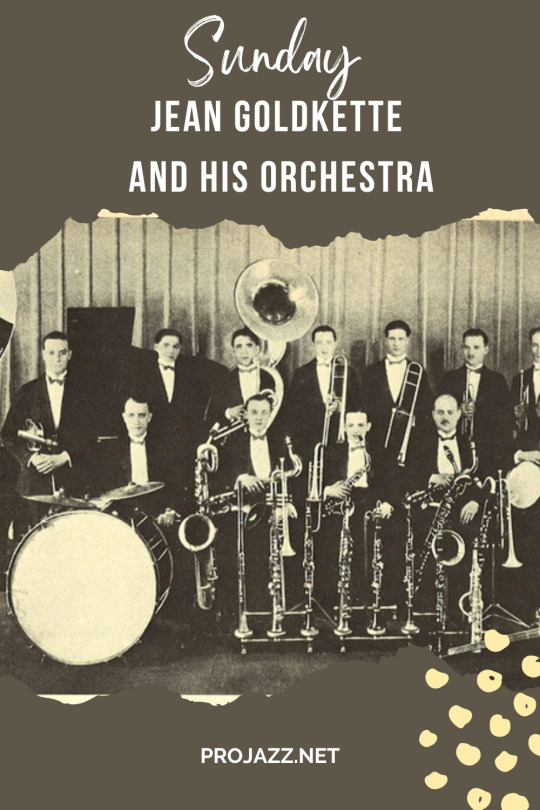
Jean Goldkette and His Orchestra (w/Bix Beiderbecke) – Sunday
New York, October 15, 1926.
4 notes
·
View notes
Text
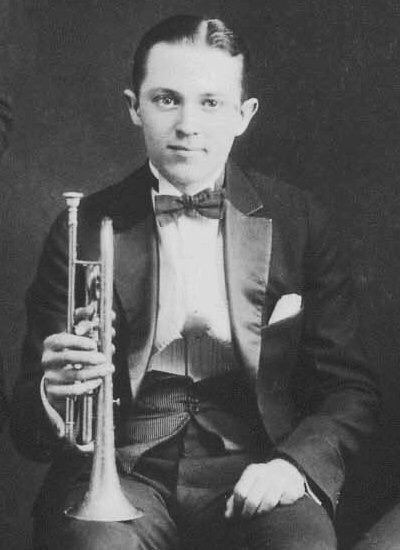
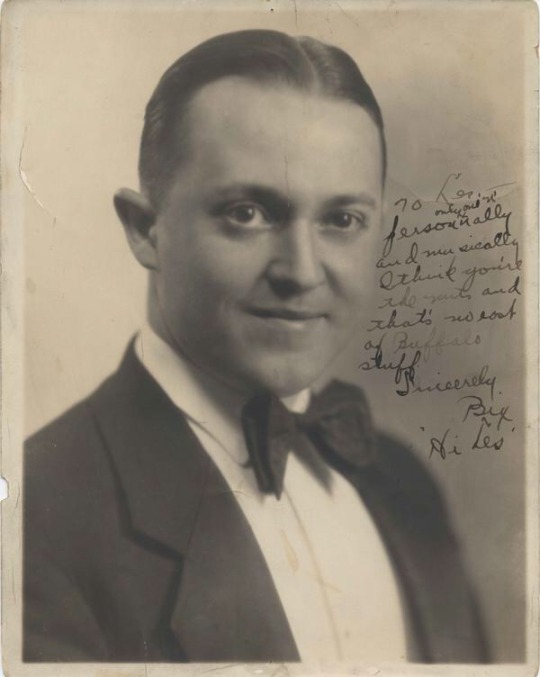


“One of the things I like about jazz, kid, is I don’t know what’s going to happen next. Do you?”
Happy birthday to Bix Beiderbecke, March 10, 1903- August 6, 1931. Leon Bismarck Beiderbecke, better known as Bix, was a jazz cornetist and pianist in the 1920s. He played for notable bands such as the Jean Goldkette Orchestra and the Paul Whiteman Orchestra, before his untimely death at the age of 28 due to years of battling alcoholism.
11 notes
·
View notes
Text
The Music of Uranus/Taurus
Something I have yet to read in the veritable blizzard of Uranus/Taurus articles, is a discussion of what happened musically during the last time Uranus was in Taurus. Even if one isn’t as obsessive about music as this author, there are plenty of amazing watershed events which can lead us to some intriguing speculations about the years 2018-2026.
April 23, 1935 - “Your Hit Parade,” sponsored by Lucky Strike cigarettes, is broadcast on the radio for the first time
Uranus, of course, rules radio. This show, broadcast every Saturday night for the next 20 years, was immensely popular. It exposed the entire nation to the week’s top 15 songs (performed by cover artists). We can argue that it was perhaps one of the first attempts to profit (Taurus) from establishing a homogenous (Taurus) US pop music (Taurus) culture (Uranus).
January 4, 1936 - “Billboard” publishes its first music hit parade
Exactly how the folks at “Your Hit Parade” calculated its top 15 song rankings is a bit, ah, murky. “Billboard,” at least, based chart positions on quantifiable sales, radio, and jukebox plays. Again, we’re seeing an attempt to standardize (and therefore make a buck from) musical taste for an entire nation. It was an innovative way (Uranus) to take advantage of electronic means of hearing popular music (radio, record players, jukeboxes) and make money (Taurus) off it, too. This was also an important milestone in the progress of “Billboard” itself, from an advertising-agency rag, to an exclusively music-oriented publication.
January 26-28, 1936 - Russian composer Dmitri Shostakovich denounced by Joseph Stalin
On the evening of January 26, Soviet dictator Josef Stalin and some “friends” attended a performance of Shostakovich’s opera “Lady MacBeth of the Mtsensk District.” Joe didn’t like it, made his displeasure visibly known - and Shostakovich left town in a hurry, only to learn, on the 28th, that the USSR paper “Pravda” had published (take it away, Wikipedia):
...a tirade entitled Muddle Instead of Music, complaining that the opera was a "deliberately dissonant, muddled stream of sounds...(that) quacks, hoots, pants and gasps." This was the signal for a nationwide campaign, during which even Soviet music critics who had praised the opera were forced to recant in print, saying they "failed to detect the shortcomings of Lady Macbeth as pointed out by Pravda".... When Shostakovich returned to Leningrad, he had a telephone call from the commander of the Leningrad Military District, who had been asked by Marshal Tukhachevky to make sure that he was all right. When the writer Isaac Babel was under arrest four years later, he told his interrogators that "it was common ground for us to proclaim the genius of the slighted Shostakovich.”
On 6 February, Shostakovich was again attacked in Pravda, this time for his light comic ballet, The Limpid Stream, which was denounced because "it jangles and expresses nothing" and did not give an accurate picture of peasant life on the collective farm. Fearful that he was about to be arrested, Shostakovich secured an appointment with the Chairman of the USSR State Committee on Culture, Platon Kerzhentsev, who reported to Stalin and Molotov that he had instructed the composer to "reject formalist errors and in his art attain something that could be understood by the broad masses", and that Shostakovich had admitted being in the wrong and had asked for a meeting with Stalin, which was not granted.
As a result of this campaign, commissions began to fall off, and Shostakovich's income fell by about three-quarters.... During 1936 and 1937, in order to maintain as low a profile as possible.., Shostakovich mainly composed film music, a genre favored by Stalin and lacking in dangerous personal expression.
This wasn’t mere censorship; Shostakovich’s life was in danger. Family and close friends (including his protector Tukhachevsky) were killed in the Stalinist purges which followed. From a certain cold-hearted perspective, this (as well as what was happening in Nazi Germany at this time) was an attempt to “set in stone” (Taurus) what popular culture (Uranus) defines as music (Taurus).
December 25, 1937 - Arturo Toscanini conducts the NBC Symphony for its first broadcast concert
The NBC Symphony orchestra was specifically created for Toscanini. Two things were going on here. One, NBC had clearly realized that there was money to be made via promulgating the classics; two, Toscanini’s particular tastes in music influenced what US symphonies played in concert halls for the next several decades (Taurus).
January 16, 1938 - Benny Goodman and his Orchestra play Carnegie Hall, New York (at 8:45 pm EST, for event chart addicts)
I can (and will!) argue that this was THE most significant musical event in the US, during the 20th Century. Originally conceived as a mere publicity stunt - Carnegie Hall, at that time, was “reserved” for classical musicians - this gig was the first jazz concert held there, and the recorded results were (upon their release in 1950) the first double LP. Best of all, the troupe was racially integrated: if we had no integrated Goodman band, then there would have been no Jackie Robinson in baseball in 1948. (No less a figure than vibraphonist Lionel Hampton averred this.)
April 9, 1939 - classical contralto Marian Anderson sings for 75,000 people at the Lincoln Memorial, Washington DC
She was there because the Daughters of the American Revolution (DAR) refused permission for an integrated concert at their own Constitution Hall. (One “reason:” no integrated bathrooms, which at the time were legally required.) Following that, the DC Board of Education refused permission for her to sing at a local high school, for the same “reason.” Again, Wikipedia:
As a result of the ensuing furor, thousands of DAR members, including First Lady Eleanor Roosevelt, resigned from the organization.... At Eleanor Roosevelt's behest, President Roosevelt and Walter White, then-executive secretary of the NAACP, and Anderson's manager, impresario Sol Hurok, persuaded Secretary of the Interior Harold L. Ickes to arrange an open-air concert on the steps of the Lincoln Memorial. The concert was performed on Easter Sunday, April 9….
Where the heck do I start?!? This was striking a blow against racism and segregation as manifested in the US capitol city. The US First Lady made this concert happen, which ensured the blow could not have been missed or glossed over - and set the bar high for future First Lady activism..
--
This is of course a “small sample” - I’m handicapped somewhat by my classical background and training, which means I am personally thrilled to pieces about things like (say) the premieres of Barber’s “Adagio for Strings” or Copland’s “Billy the Kid” or Piston’s “The Incredible Flutist.” And so forth. I don’t know if my readers have a similar background, though; I’m therefore forced to leave things at “the second half of the 1930s was an amazing time for US composers.”
(And that may be due to the nation’s Neptune return anyway. However, over two-thirds of the Uranus/Taurus transit will fall in the US natal 5th House - and for part of that time, the U.S. has an opposition from natal to transiting Neptune. Author rubs hands together gleefully.)
So, what kind of music can we expect from Uranus/Taurus in our 21st century? I think we have identified three general themes:
Making money off music, by innovatively “organizing” previous technological innovations
Think digital recording, the MP3, autotune, iPod, GarageBand, and SoundCloud - and remember that before “Your Hit Parade” and “Billboard,” nobody had ever heard of a “Top 15,” much less any idea of the marketing capabilities.
Homogenous, nationalistic pop culture
This may well manifest as censorship; I don’t believe that Dolt 45 (for example) has any more musical taste or chops than Joseph Stalin had. And, he seems to share the general Nazi abhorrence for the non-Aryan.
Breaking down racial barriers in music
Benny Goodman’s chosen genre of jazz, swing music, “brought to fruition ideas originated with Louis Armstrong, Earl Hines, Fletcher Henderson, Duke Ellington, and Jean Goldkette” - only the latter of whom was not an African-American - and furthermore “was precipitated by spicing up familiar commercial, popular material with a Harlem oriented flavor and selling it via a white band for a white musical/commercial audience.” (Wikipedia) In a cynical mood befitting 2018, we have to wonder if white people won’t again “discover” some non-white form of musical expression, rendering it palatable for/to the (white) masses, and therefore making a ton of money.
I’d rather think of music making people steadfast. Someone who once used the n-word around Benny Goodman was told by the feisty clarinet player, “I’ll knock you out if you use that word around me again.”
=====
Finally, let me throw in this Uranus/Taurus caveat: astrologers aren’t any more immune to the lure of clickbait than anyone else. I’ve seen so many articles already about how to survive the dire times ahead - and, let’s face it, human monkeys like to be scared and thrilled. Please don’t believe everything you read, here included; please keep in mind that (to a certain extent) our dread of what’s to come will actually affect what actually comes.
32 notes
·
View notes
Text
8/14 Angela Simpson / Angela spec5001 等更新しました。
おはようございます、更新完了しました。https://bamboo-music.net
Johnny Griffin / Kerry Dancers rlp420
Dizzy Gillespie Big Band / Birks' Works mgv8222
Cannonball Adderley / Alto Giant orl8248
Clark Terry / with Thelonious Monk Jlp996
Shelly Manne / and His Friends C3525
Dizzy Gillespie / Groovin' High Mg12020
Teddy Wilson / and His All Stars and Orchestra 18169
Sidney Bechet Muggsy Spanier / Bechet Spanier Quartet 4123
Jean Goldkette / Big Band Jazz of the 20's lva3017
Al Cohn / Play It Now 110
Sabu Martinez / Burned Sugar mellolp5
Chico Buarque / Opera do Malandro 6349.400/401
Curtis Mayfield / Do It All Night cuk5022
Louis Hayes / Variety Is The Spice G787
Angela Simpson / Angela spec5001
BAMBOO MUSIC(バンブーミュージック)
大阪市北区万歳町3番41号シロノビル104号室
06-6363-2700 http://bamboo-music.net
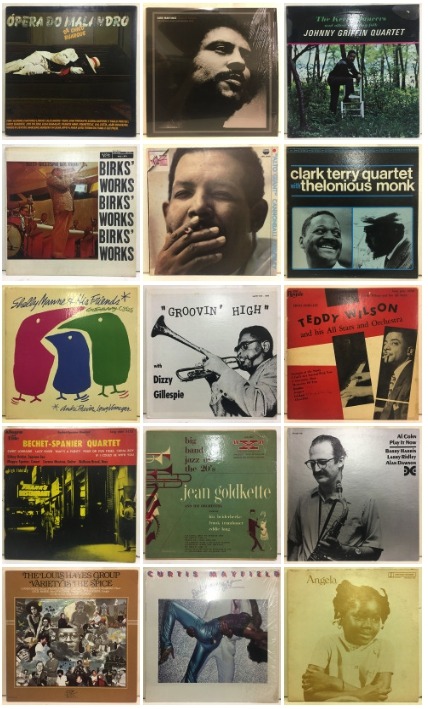
0 notes
Text
Audio & Playlist for February 9, 2019: Home

Illustration by Doris Smith from Need a House? Call Ms. Mouse!
Here are some songs about home! Houses, hometowns, the general concept of home, and a lot of songs about being away from home in various ways and for various reasons.
link to audio
Playlist:
Bay City Rollers - Saturday Night (Uneasy Listening theme song)
Lene Lovich - Home
DJ speaks over The Avengers VI - Coming Home Baby
The Breeders - Don't Call Home
The Troggs - From Home
Colin Blunstone - Let's Keep the Curtains Closed Today
Sebastian Williams - Hometown Boy
The Lewd - Mobile Home
DJ speaks over Tal Henry & His Orchestra - My Little Home Down in New Orleans
The Kinks - A Long Way From Home
The Shop Assistants - Home Again
The Fall - My New House
Husker Du - Broken Home, Broken Heart
X - In This House That I Call Home
The Rolling Crew - Home on Alcatraz
DJ speaks over The Clean - Safety at Home
Shopping - The Long Way Home
The Raincoats - Adventures Close to Home
The Missing Lynx - Louie Go Home
Voo-Doo Church - Live With the Dead
The Auteurs - Housebreaker
The Freeze - No One's Ever Coming Home
Gil Scott-Heron - Home is Where the Hatred Is
The Pentangle - Travelling Song
The Tourists - So Good to Be Back Home Again
Gang of Four - At Home He's a Tourist
Jean Goldkette and His Orchestra - That's What Puts the Sweet in Home Sweet Home
The Carter Family - My Old Cottage Home
Jacqueline Perez - Go Home
Adam and the Ants - Killer in the Home
The Osmonds - Goin' Home
Galaxie 500 - When Will You Come Home
Asterix - Broken Home
Drake Tungsten - Call Me When YOu Get Home
The Clash - Safe European Home
Solomon Burke - Home in Your Heart
Clarence Ashley - The House Carpenter
The Viscounts - I'm Coming Home Baby
The Desperate Bicycles - The Housewife Song
Doris Day - Sentimental Journey
#radio#playlist#music#podcast#home#community radio#college radio#wprb#proto metal#post punk#uk diy#lounge music#new music#indie rock#punk#folk rock#yeh yeh#garage rock#northern soul#merseybeat
0 notes
Text
Harry & Edna on the Wireless; Author Lord Joe Wells
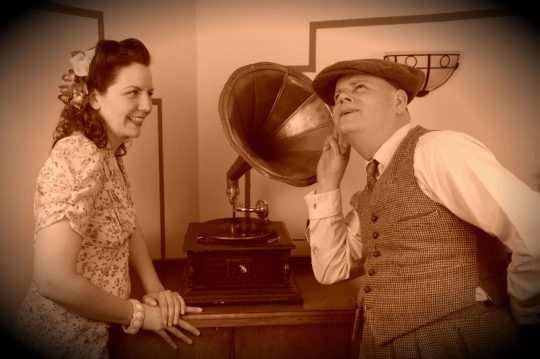
Today's Bombshell (Bombshell Radio)
Bombshell Radio Sundays Harry & Edna on the Wireless
Sunday's 10am-11am EST and Mondays 1am-2am
bombshellradio.com
PLAYING TRACKS BY
Fran Frey & George Olsen & His Music, Gene Austin, Al Johnson, Jean Goldkette & His Orchestra, Lou Levin and more.
#lifestyle #vintage #retro#swing #big band #LordJoeWells #BombshellRadio
In this episode of Harry & Edna on the Wireless the vintage duo are joined by author Lord Joe Wells.
Plus they play tip top gramophone Tunes from the 1930s and 1940s.
So enjoy this hour with Harry & Edna on the Wireless as they take a look at the current British vintage scene.
Read the full article
0 notes
Photo
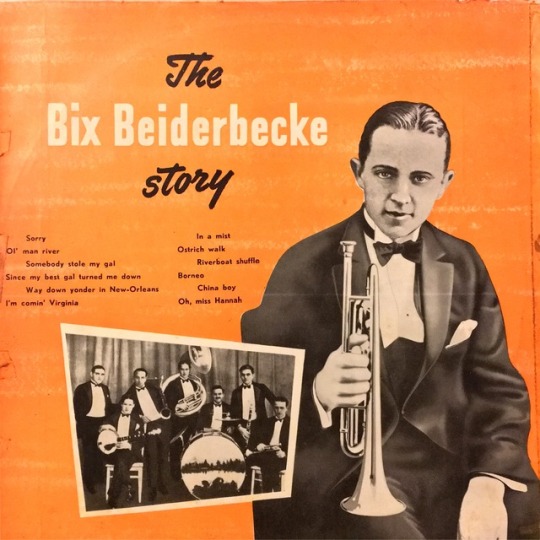
Bix Beiderbecke
The Bix Beiderbecke Story
@1957 UK Pressing
*****
Leon Bismark "Bix" Beiderbecke (March 10, 1903 – August 6, 1931) was an American jazz cornetist, jazz pianist, and composer.
With Louis Armstrong and Muggsy Spanier, Beiderbecke was one of the most influential jazz soloists of the 1920s. His turns on "Singin' the Blues" and "I'm Coming, Virginia" (both 1927), in particular, demonstrated an unusual purity of tone and a gift for improvisation. With these two recordings, especially, he helped to invent the jazz ballad style and hinted at what, in the 1950s, would become cool jazz. "In a Mist" (1927), one of a handful of his piano compositions and one of only two he recorded, mixed classical (Impressionist) influences with jazz syncopation.
A native of Davenport, Iowa, Beiderbecke taught himself to play cornet largely by ear, leading him to adopt a non-standard fingering some critics have connected to his original sound. He first recorded with Midwestern jazz ensembles, The Wolverines and The Bucktown Five in 1924, after which he played briefly for the Detroit-based Jean Goldkette Orchestra before joining Frankie "Tram" Trumbauer for an extended gig at the Arcadia Ballroom in St. Louis. Beiderbecke and Trumbauer joined Goldkette in 1926. The band toured widely and famously played a set opposite Fletcher Henderson at the Roseland Ballroom in New York City in October 1926. He made his greatest recordings in 1927 (see above). In 1928, Trumbauer and Beiderbecke left Detroit to join the best-known dance orchestra in the country: the New-York-based Paul Whiteman Orchestra.
Beiderbecke's most influential recordings date from his time with Goldkette and Whiteman, although they were generally recorded under his own name or Trumbauer's. The Whiteman period also marked a precipitous decline in Beiderbecke's health, brought on by the demand of the bandleader's relentless touring and recording schedule in combination with Beiderbecke's persistent alcoholism. A few stints in rehabilitation centers, as well as the support of Whiteman and the Beiderbecke family in Davenport, did not check Beiderbecke's decline in health. He left the Whiteman band in 1930 and the following summer died in his Queens apartment at the age of 28.
His death, in turn, gave rise to one of the original legends of jazz. In magazine articles, musicians' memoirs, novels, and Hollywood films, Beiderbecke has been reincarnated as a Romantic hero, the "Young Man with a Horn". His life has been portrayed as a battle against such common obstacles to art as family and commerce, while his death has been seen as a martyrdom for the sake of art. The musician-critic Benny Green sarcastically called Beiderbecke "jazz's Number One Saint," while Ralph Berton compared him to Jesus. Beiderbecke remains the subject of scholarly controversy regarding his true name, the cause of his death, and the importance of his contributions to jazz.
3 notes
·
View notes
Video
youtube
0 notes
Video
youtube
I've been dormant (for the two of you), but check this out! Dinah has never sounded so hot.
2 notes
·
View notes
Photo

Jean Goldkette and His Orchestra – My Pretty Girl
“My Pretty Girl” (Charles Fulcher)
Recorded on the 1st February, 1927 for Victor.
This was the alternative take of this song, listed as BVE 37587-2
1 note
·
View note
Text
Wow, today must be national tag Shannon day! I don’t mind at all, I’m so bored so this is entertaining!
So, @radio-da-da tagged me to put my music on shuffle and list the first twenty songs that play. Thank you for tagging me!
1. Tiger Rag by The Wolverines (1924)
2. There Ain’t No Sweet Man Worth the Salt of my Tears by Bix Beiderbecke (1928)
3. Your Mother’s Son In Law by Billie Holiday (1933)
4. Feeling No Pain by Red and Miff’s Stompers (1928)
5. Changes by the Paul Whiteman Orchestra (1928)
6. San by the Paul Whiteman Orchestra (1928)
7. There’ll Come a Time by Bix Beiderbecke (1927)
8. There’ll Come a Time by Red Nichols and his Five Pennies (1928) (different versions of the same song twice in a row!)
9. I’m Looking Over a Four Leaf Clover by the Jean Goldkette Orchestra (1927)
10. Chattanooga Choo Choo by Glenn Miller (1941)
11. Love Her by Radio by Billy Jones (1922)
12. Melancholy Baby by the Charleston Chasers (1928)
13. Goodbye Broadway Hello France by the American Quartet (1918)
14. Doctor Jazz by Jelly Roll Morton (1926)
15. In the Mood by Glenn Miller (1939)
16. On the Alamo by Isham Jones (1922)
17. Hello Hawaii How Are You by Nora Bayes (1916)
18. Mighty Blue by the Abe Lyman Orchestra (and possibly Buster Keaton??) (1925)
19. Down Where the Swanee River Flows by the Peerless Quartet (1916)
20. I Wonder Where My Baby is Tonight by the Ben Selvin Orchestra (1929)
I won’t be tagging anyone because I’ve tagged so many people today and don’t really have anyone else to tag. If you’d like to do this, just say I tagged you!
6 notes
·
View notes
Audio
Varsity Drag || Jean Goldkette and His Orchestra || Dance Hits of the '20s in Hi-Fi
1 note
·
View note
Audio
"Hoosier Sweetheart"
Jean Goldkette and His Orchestra
Bix Beiderbecke on cornet, vocals by Ray Muerer
recorded January 31, 1927
#literally perfect#bix beiderbecke#hoosier sweetheart#jean goldkette#jean goldkette and his orchestra#ray muerer#1927#1920s#music#songs i align my life to
82 notes
·
View notes
Text
I was tagged by the lovely @gecrgemackays for this. Thank you very much for tagging me :)
RULES: You can tell a lot about someone by the type of music they listen to. Hit shuffle on your media player and write down the first 20 songs, then tag 10 or more people. No skipping!
I listen to music on YouTube, and when I click shuffle on my main playlist it only really shuffles the songs towards the beginning... anyways, behold my strange taste in music...
1. Oui Oui Marie by Arthur Fields (1918)
2. Thou Swell by Bix Beiderbecke and his gang (1928)
3. At The Jazz Band Ball by the Original Dixieland Jass Band (1918)
4. Three Blind Mice by Frankie Trumbauer and his Orchestra (1927)
5. Your Mother’s Son In Law by Billie Holiday (1933)
6. In the Mood by Glenn Miller (1939)
7. I Didn’t Know by Jean Goldkette and his Orchestra (1924)
8. Livery Stable Blues by the Original Dixieland Jass Band (1917)
9. Feeling No Pain by Red and Miff’s Stompers (1927)
10. Chattanooga Choo Choo by Glenn Miller (1941)
11. Ostrich Walk by the Original Dixieland Jass Band (1918)
12. Royal Garden Blues by Bix Beiderbecke (1927)
13. Down Where the Swanee River Flows by the Peerless Quartet (1916)
14. Melancholy Baby by the Charleston Chasers (1928)
15. Dancing Shadows by the Paul Whiteman Orchestra (1928)
16. The Rhythm King by Bix Beiderbecke and his Gang (1928)
17. There’ll Come a Time by Red Nichols and his Five Pennies (1928)
18. Over There by Nora Bayes (1917)
19. Good Morning Mr. Zip Zip Zip by Eugene Buckley (Arthur Fields) and the Peerless Quartet (1918)
20. Dipper Mouth Blues by King Oliver (1923)
Yes, I listen to 1910s and 1920s music on a regular basis. What can I say, I’m a time traveller
Thanks again for the tag :)
I tag @hobbadehoy, @made-by-our-history, @my-little-kraken, @where-colonel-mackenzie, @a-british-guardsman, and @akkerdistel if any of you would like to do this!
8 notes
·
View notes
Audio
Blue Skies || Jean Goldkette and His Orchestra || Dance Hits of the '20s in Hi-Fi
2 notes
·
View notes